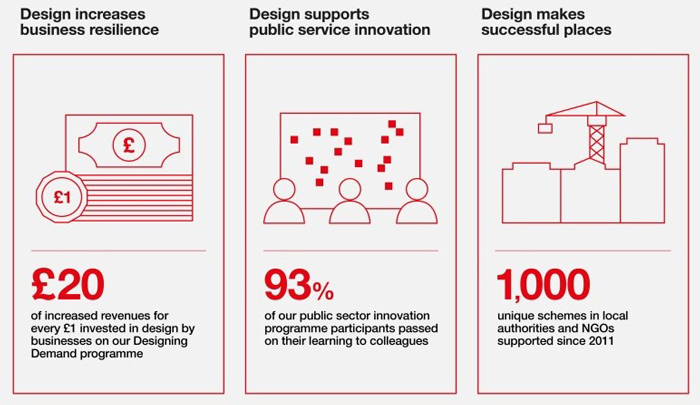Support for the Design Economy
A recent industry study commissioned by the Creative Industries Federation (CIF) predicts the creative industry faces a potential loss of £74 billion in turnover by the end of 2020, which could cost over 400,000 jobs and result in a 25% reduction in the creative sector’s Gross Value Added (GVA). This study includes all sectors of the creative industry from the arts, film production to architecture and design.

We asked the Design Council (DC) to estimate the impact of COVID-19 on those sub sectors related to the BCFA membership. Matthew Young, Senior Policy Advisor at Design Council explains, “As a sub-sector of the CIF study, the elements of design which are traditionally seen as part of the creative industries bears a relatively modest slice of the pain, with a possible loss in GVA of £2billion, but that statistic is sadly far from the whole story. Projections by Oxford Economics, who have used the Design Council’s more comprehensive methodology from our Design Economy series estimates that there could be a reduction of £37-42 billion in GVA by the end of 2020. Design Council’s last estimate of the sector’s size was made in 2016 and stood at £85 billion.”
The Design Council has championed the value of design, using evidence-based research to show its economic, social and environmental impact to demonstrate how design has contributed to three major areas of the economy – business innovation, places and public services.

Source: Design Council
Whilst over half of the forecasted decline is expected in London, almost every region will be affected. In their endeavor to support the industry, the BCFA’s Design Insider online magazine has enhanced their Design Insider Jobs service. This valuable resource now includes useful articles, career profiles, webinars and top tips on how designers can market their services which includes advice on how to get more out of platforms such as LinkedIn which has 3.5m architecture and planning users and has proven to be the most effective social media platform in generating B2B leads.
The British Institute of Interior Design (BIID) also report many of their interior designer members have seen a reduction in projects due to COVID-19 but are positive regarding the longer-term outlook.
“We are very hopeful that the majority of postponed projects will continue at a later day. We have also seen many designers remaining busy and able to work by changing the way they operate. The use of video technology really has revolutionised the way people do business. This is a change that many designers have said they will continue even after COVID-19. While it will never replace face to face meetings, it has certainly proven to be a great addition”, explains Charlotte Davies ,Marketing Manager British Institute of Interior Design.
Known for their excellent education and CPD resources, we asked BIID how much business has been lost and what they are doing to support their members, Charlotte Davies said, “We have seen figures being mentioned re losses of turnover but at this stage we really can’t put a figure on what this crisis will cost the industry. For those designers facing redundancy and uncertainty we have created many resources on our website. We would suggest they take time to read the resources and if they are considering setting up on their own to take a look at our guide.”
The UK creative industry is world renowned, and we have seen many positive examples of interior designers raising their profile by launching new online business and investigating re-skilling in related areas such as product design. There is good support out there, formed in 2017, the Furniture Interiors Education, Skills and Training Alliance (FIESTA) address the furniture and interiors industry’s current and future skills needs by encouraging and inspiring new talent to join the industry, and ensuring relevant education, training and qualifications are in place to support them.

The BCFA, BIID and FIESTA are providing invaluable support to designers during this uncertain time, as well as bolstering calls by the Design Council for continued Government support.
Matthew Young, Senior Policy Advisor at Design Council, said: “Government support has been crucial in preventing the economy from going into an immediate nosedive, and it has been most welcome. That support needs to be scaled back only carefully, and with full recognition of the uneven nature of the economic shock which will be unwinding in coming months. Some sectors have struggled far more than others, but we need to be aware of the time it will take to get back to where we were. Design and designers have an almost infinite capacity for regeneration, regrowth, and finding new opportunities to innovate and improve our world, but they can only do so if they are working. We urge the government to maintain flexibility in its support packages and be aware of how different sectors are progressing and to incentivise the use of design by businesses through this support.”
Conscious there are regional variances, as he goes on to explain, “A design sector that had been flourishing is now under unparalleled pressure. And we know that the effects of the lockdown and the impact of the resulting unemployment will be felt across the nation, presenting a major challenge to the levelling up agenda. The CIF analysis shows that there could be disproportionate impacts in different regions, where there are different specialisms, such as craft in the West Midlands, and data from Cambridge Econometrics shows that those outside of London may take longer to ‘bounce back’. The benefits of a flourishing design economy is already uneven across the UK, with nearly half of the UK’s design-intensive firms being based in London and the South-East of England. But there are still over a million jobs in design outside those regions (when last measured in 2016) and the risk of increasing this inequality between regions is great if there is an insufficient policy response to the recession.”
Design Insider’s recent catch up with BCFA members on the future of boutique hotels found that the regional hospitality sector was doing well in comparison to city business destinations. Whilst London is important, in recent years there has been a trend towards regional architect and interior design practices working with BCFA members. Product differentiation is vital for many BCFA members, so ultimately great design is integral to business success.




